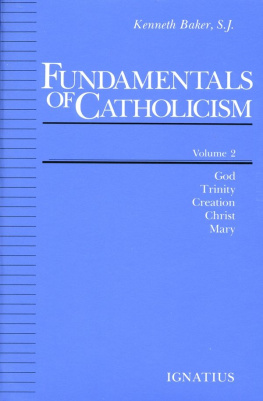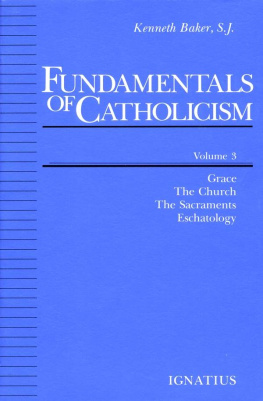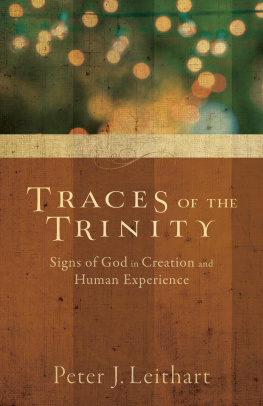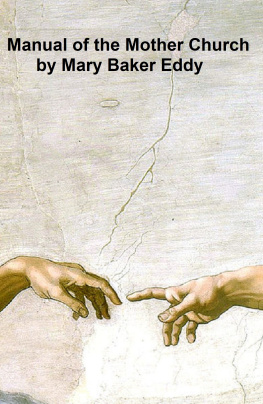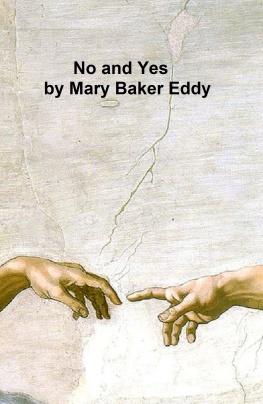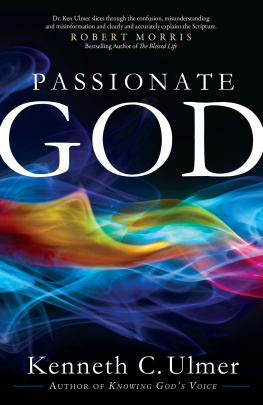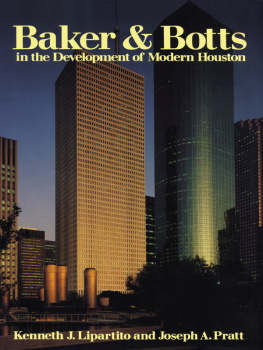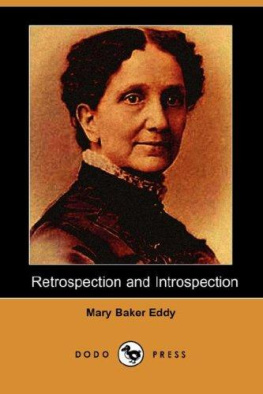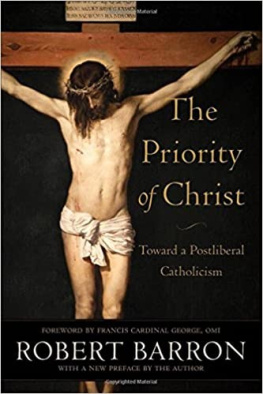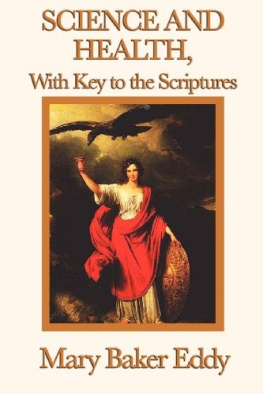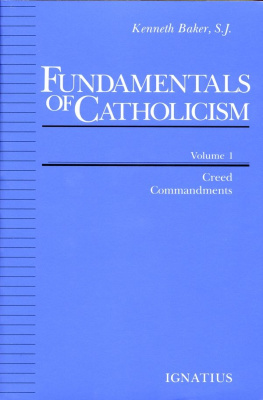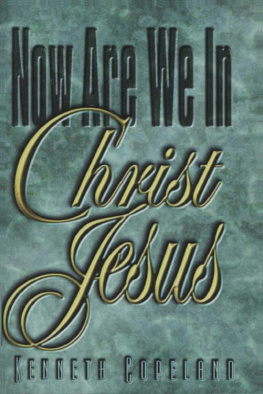Kenneth Baker - Fundamentals of Catholicism God, Trinity, Creation, Christ, Mary.
Here you can read online Kenneth Baker - Fundamentals of Catholicism God, Trinity, Creation, Christ, Mary. full text of the book (entire story) in english for free. Download pdf and epub, get meaning, cover and reviews about this ebook. City: San Francisco, year: 1983, publisher: Ignatius Press, genre: Religion. Description of the work, (preface) as well as reviews are available. Best literature library LitArk.com created for fans of good reading and offers a wide selection of genres:
Romance novel
Science fiction
Adventure
Detective
Science
History
Home and family
Prose
Art
Politics
Computer
Non-fiction
Religion
Business
Children
Humor
Choose a favorite category and find really read worthwhile books. Enjoy immersion in the world of imagination, feel the emotions of the characters or learn something new for yourself, make an fascinating discovery.
- Book:Fundamentals of Catholicism God, Trinity, Creation, Christ, Mary.
- Author:
- Publisher:Ignatius Press
- Genre:
- Year:1983
- City:San Francisco
- Rating:4 / 5
- Favourites:Add to favourites
- Your mark:
- 80
- 1
- 2
- 3
- 4
- 5
Fundamentals of Catholicism God, Trinity, Creation, Christ, Mary.: summary, description and annotation
We offer to read an annotation, description, summary or preface (depends on what the author of the book "Fundamentals of Catholicism God, Trinity, Creation, Christ, Mary." wrote himself). If you haven't found the necessary information about the book — write in the comments, we will try to find it.
Fundamentals of Catholicism God, Trinity, Creation, Christ, Mary. — read online for free the complete book (whole text) full work
Below is the text of the book, divided by pages. System saving the place of the last page read, allows you to conveniently read the book "Fundamentals of Catholicism God, Trinity, Creation, Christ, Mary." online for free, without having to search again every time where you left off. Put a bookmark, and you can go to the page where you finished reading at any time.
Font size:
Interval:
Bookmark:
FUNDAMENTALS OF CATHOLICISM
VOLUME II
OF
CATHOLICISM
VOLUME II
by
KENNETH BAKER, S.J.
IGNATIUS PRESS SAN FRANCISCO
Imprimi Potest: Thomas R. Royce, S.J.
Provincial, Oregon Province
of the Society of Jesus
Portland, Oregon
Imprimatur: + Thomas J. Welsh
Bishop of Arlington, Virginia
Cover design by Riz Boncan Marsella
1983 Kenneth Baker, S.J.
All rights reserved
ISBN 978-0-89870-019-0 (PB)
ISBN 978-1-68149-732-7 (EB)
Library of Congress catalogue number 82-80297
Co-published by Ignatius Press, San Francisco
and Homiletic & Pastoral Review
Printed in the United States of America
UNITY OF GOD
OUR KNOWLEDGE OF GOD
One of the basic problems currently confronting American society is that of belief in a transcendent God who is the Eternal Judge of each person. I for one do not doubt that loss of belief in a personal God (that is, atheism) is at the root of many of our social problems, such as abortion, divorce, pornography, murder, drug addiction, and so forth.
Our modern technological society, which has helped produce an affluent life style for a large proportion of the population, has been accompanied by a significant decline in church attendance and belief in God. There is nothing new in the observation that man tends to forget his Creator when he is prosperous. That stands out very clearly in the Bible, especially in the Old Testament.
I dont know how obvious it is to you, but it is certainly obvious to me, that atheism has become much more common in the past twenty years than it was before. Of course, there are different kinds oi atheism. There are explicit theoretical atheists who will give you arguments why they think there is no Godusually the arguments are based on the presence of evil, disease, poverty, war, and so forth.
In this country, with a long and strong tradition of religious belief, perhaps what is known as practical atheism is much more prevalent. The practical atheist is the person who gives some kind of verbal assent to the existence of God but lives as if God did not exist and as if he did not have to give an account of his stewardship to God after his death. For every theoretical atheist, such as a convinced Marxist, there are dozens of practical atheists.
It is strange but true that it often takes great suffering or tragedy to bring men back to a realization of their total dependence on God the Creator. Cancer, blindness, paralysis, imminent death often are much more effective than homilies, C.C.D. classes or college theology courses.
One of the reasons for the growing loss of faith in God is the all-pervading secularism that surrounds us. In this context secularism means the exclusion of God from public life and public affairs. The national government, cities and corporations are run as if God did not exist and as if the persons in charge would not have to give an account of their actions to God Almighty on the day of judgment.
I have been teaching university students for almost twenty years. Over ten years ago I began to notice the mounting skepticism among Catholic students about the existence of God and especially about the ability of the human mind to be certain about the existence of God and to grasp universal principles of morality. It came to me as something of a shock in 1968 to discover that over ninety percent of the Catholic college students I was teaching held some form of situation ethics, that is, a theory of moral relativism which holds that no moral act (such as adultery or fornication) is always and in all circumstances evil.
It seems to me that much of this skepticism and practical atheism flows from a lack of clear knowledge of some of the basic principles of philosophy and theology. It is not necessary for me here to belabor the point that in many of our schools Catholic doctrine and faith are not taught with the clarity and conviction that they once were.
In the magnificent Catholic tradition there are immense treasures of wisdom and knowledge available to all who take the trouble to look for them. I am convinced that the Catholic who knows his faith well possesses adequate weapons to defend himself against all the attacks of our contemporary secularism.
What I hope to do in the following essays is simply to expound the Churchs teaching on what we can know about God by the natural light of reason and what we can know about him from faith and divine revelation.
MAN CAN KNOW GOD WITH CERTAINTY
As Catholics, most of us were taught about God from early childhood. Our parents taught us how to make the Sign of the Cross; they told us about Jesus, Mary and Joseph, especially in reference to Christmas. So we learned about God from othersfrom parents, relatives and teachers in grade school. The question I wish to propose today is the following: Granted that we learned about God from others, is the human mind capable of knowing something about God through the use of its own power?
There are those who say that man cannot know anything about God, since we perceive only material things and by definition God must be spiritual or essentially above material bodies. He may exist, they say, but we can never know for sure, and we can know nothing definite about such a Being. People who hold such views are often referred to as agnostics or skeptics.
Then there are the atheists who explicitly deny the existence of God. They are usually pragmatists and materialists. Convinced Marxists and communists fit into this category. They go beyond the agnostics since they affirm with certainty that God does not exist.
In the history of the Church, especially in the nineteenth century, we find a group of intellectuals called traditionalists who maintained that the only way we can know about God with certainty is from a divine revelation. In order to explain why all primitive peoples had and have a belief in God of some kind, they claimed that an original revelation given to Adam and Eve was handed down from one generation to the next. That explains, they said, the universal belief in a god of some kind. This view was condemned by Pope Gregory XVI and Pope Pius IX.
What does the Catholic Church say about the ability of mans mind to know God? In 1870 the First Vatican Council made the following official declaration: Holy Mother Church holds and teaches that God, the origin and end of all things, can be known with certainty by the natural light of human reason from the things that he created (see Denzinger 1785, 1806). What does this mean? It means that the mature human mind has the capability within itself to conclude to the existence of God by considering the wonders of creation, such as the sun, moon, stars, flowers, ocean, animals and plants.
The definition is a general statement, so it does not say that every person has this capability. Many are defective for one reason or another; some have been corrupted by environment and education. The Church merely says that the human mind can do itwithout saying how many or how few can do it. Please note also that, according to Vatican I, Gods existence can be known with certainty. Certainty is much more than a hunch, an opinion or a guess. The source from which Gods existence is deduced is the multiplicity of things that he created. Created things are finite; they are moved or produced by another. Since there cannot be an infinite series of finite beings moving another, there must ultimately be one infinite or unmoved source of movement in all the others. That first unmoved mover we call God. St. Thomas Aquinas develops this argument at length and we will return to it later.
According to the testimony of the Bible the existence of God can be known from nature. Wisdom 13:1-9 is a good passage to read on this point, especially verse 5: Through the grandeur and beauty of the creatures we may, by analogy, contemplate their Author. St. Paul in his Letter to the Romans says: For what can be known about God is perfectly plain to them since God himself has made it plain. Ever since God created the world his everlasting power and deityhowever invisiblehave been there for the mind to see in the things he has made (1:19-20).
Next pageFont size:
Interval:
Bookmark:
Similar books «Fundamentals of Catholicism God, Trinity, Creation, Christ, Mary.»
Look at similar books to Fundamentals of Catholicism God, Trinity, Creation, Christ, Mary.. We have selected literature similar in name and meaning in the hope of providing readers with more options to find new, interesting, not yet read works.
Discussion, reviews of the book Fundamentals of Catholicism God, Trinity, Creation, Christ, Mary. and just readers' own opinions. Leave your comments, write what you think about the work, its meaning or the main characters. Specify what exactly you liked and what you didn't like, and why you think so.

